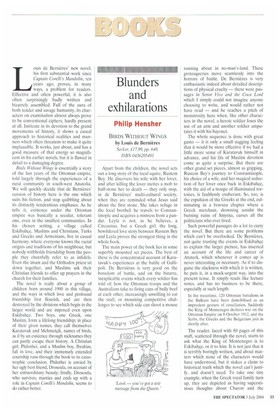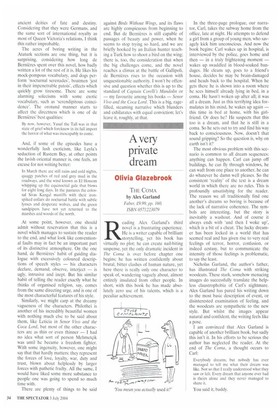Blunders and exhilarations
Philip Hensher
BIRDS WITHOUT WINGS by Louis de Bernieres Secker, L17.99, pp. 640, ISBN 0436205491 Louis de Bern ieres' new novel, his first substantial work since Captain Corelli's Mandolin, ten years ago, proves, in many ways, a problem for readers. Effective and often powerful, it is also often surprisingly badly written and bizarrely assembled. Full of the aura of both tender and savage humanity, its characters on examination almost always prove to be conventional ciphers, hardly present at all. Intricate in its devotion to the grand movements of history, it shows a casual approach to historical realities and manners which often threatens to make it quite implausible. It works, just about, and has a good measure of that energy so magnificent in his earlier novels, but it is flawed in detail to a damaging degree.
Birds Without Wings is essentially a story of the last years of the Ottoman empire, told largely through the experiences of a rural community in south-west Anatolia. We will quickly decide that de Bernieres' version of history here is the one which suits his fiction, and stop quibbling about its distinctly tendentious emphases. As he tells it, existence under the Ottoman empire was basically a secular, tolerant one, even in the smallest communities. In his chosen setting, a village called Eskibahce, Muslims and Christians, Turks and Greeks and Armenians, live in casual harmony, where everyone knows the racial origins and traditions of his neighbour, but nobody withholds friendship from the people they cheerfully refer to as infidels. Even the imam and the Orthodox priest sit clown together, and Muslims ask their Christian friends to offer up prayers in the church for their families.
The novel is really about a group of children born around 1900 in this village, and the ways in which love and profound friendship first flourish, and are then destroyed by the divisions which begin in the larger world and are imposed even upon Eskibahce. Two boys, one Greek, one Muslim, form a lifelong friendship; in place of their given names, they call themselves Karatavuk and Mehmetgik, names of birds, as if by an existence through nicknames they can partly escape their history. A Christian girl, Philothei, and a Muslim boy, Ibrahim, fall in love, and their immensely extended courtship runs through the book to its catastrophic conclusion. Philothei is envied by her ugly best friend, Drosoula, on account of her extraordinary beauty; finally, Drosoula, who survives, marries and ends up with a role in Captain Corelli's Mandolin, seems to do rather better. Apart from the children, the novel sets out a long story of the local squire, Rustem Bey. He discovers his wife with her lover, and after killing the lover incites a mob to half-stone her to death — they only stop, in de Bernieres' multi-cultural society, when they are reminded what Jesus said about the first stone. She takes refuge in the local brothel; he travels to Constantinople and acquires a mistress from a pandar. Leyla is not, as he believes, a Circassian, but a Greek girl; the long, bewildered love story between Rustem Bey and Leyla proves the strongest thing in the whole book.
The main power of the book lies in some superbly mounted set pieces. The best of these is the concentrated account of Karatavuk's experiences at the battle of Gallipoli. De Bernieres is very good on the boredom of battle, and on the bizarre, inexplicable events which every soldier has told of; how the Ottoman troops and the Australians take to firing cans of bully beef at each other, increasingly unwilling to eat the stuff, or mounting competitive challenges to see which side can shoot a mouse
running about in no-man's-land. These grotesque ries move seamlessly into the horrors of battle. De Bernieres is very enthusiastic indeed about detailed descriptions of physical cruelty — there were passages in Senor Vivo and the Coca Lord which I simply could not imagine anyone choosing to write, and would rather not have read — and he reaches a pitch of monstrosity here when, like other characters in the novel, a heroic soldier loses the use of an arm and another soldier amputates it with his bayonet.
The whole sequence is done with great gusto — it is only a small nagging feeling that it would be more effective if we had a little more sense of Karatavuk himself in advance, and his fits of Muslim devotion come as quite a surprise. But there are other grand set pieces, almost as gripping. Rustem Bey's journey to Constantinople, his choice of a wife, and her magical seduction of her lover once back in Eskibahce, with the aid of a troupe of illuminated tortoises, is faultlessly exuberant. So, too, is the expulsion of the Greeks at the end, culminating in a bravura chapter where a Greek merchant, drowning amidst the burning ruins of Smyrna, curses all the politicians who ever lived.
Such powerful passages do a lot to carry the novel. But there are some problems which can't be overlooked. De Bernieres, not quite trusting the events in Eskibahce to explain the larger picture, has inserted an account of the life and career of Ataturk, which whenever it comes up is never interesting or necessary. As if to disguise the slackness with which it is written, he puts it, in a mock-urgent way, into the present tense. It simply reads like lecture notes, and has no business to be there, especially at such length:
In the meantime, 120 Ottoman battalions in the Balkans have been demobilised as an imprudent gesture of conciliation. Suddenly the King of Montenegro declares war on the Ottoman Empire on 8 October 1912, and the Serbs, the Greeks and the Bulgarians join in shortly after.
The reader, faced with 80 pages of this stuff, scattered through the novel, starts to ask what the King of Montenegro is to Eskibahge, or it to him. It is not just that it is terribly boringly written, and about matters which none of the characters would have understood, but it stakes a claim to historical truth which the novel can't justify, and doesn't need. To take one tiny example, when the Greek royal family turn up, they are depicted as having superstitious thoughts about Charon and the
ancient deities of fate and destiny. Considering that they were Germans, and the same sort of international royalty as most of Queen Victoria's relations, I think this rather improbable.
The acres of boring writing in the Ataturk sections are one thing, but it is surprising, considering how long de Bernieres spent over this novel, how badly written a lot of the rest of it is. He likes his mock-pompous vocabulary, and dogs perform 'nocturnal serenades', boatmen 'jest in their impenetrable patois', effects which quickly grow tiresome. There are some alarming solecisms with some exotic vocabulary, such as 'serendipitous coincidence'. The orotund manner starts to affect the directness which is one of de Bernieres' best qualities:
By now, however, Yusuf the Tall was in that state of grief which foreknew in its full import the horror of what was inescapably to come.
And, if some of the episodes have a wonderfully lush exoticism, like Leyla's seduction of Rustem Bey, at other points the lavish oriental manner is, one feels, an excuse for not writing better:
In March there are still rains and cold nights, quaggy patches of red and grey mud in the roadways, and the wind known as El Hossom whipping up the equinoctial gale that blows for eight long days. In the pastures the colossal Sivas Kangal mastiffs with their ironspiked collars do nocturnal battle with subtle lynxes and desperate wolves, and the green sandpipers have not yet returned to the marshes and woods of the north.
At some point, however, one should admit without reservation that this is a novel which manages to sustain the reader to the end, and what look like conventional faults may in fact be an important part of its distinctive atmosphere. On the one hand, de Bernieres' habit of guiding dialogue with excessively coloured descriptions of speech styles — his characters declare, demand, observe, interject — is ugly, intrusive and inept. But his similar habit of telling the reader exactly what he thinks of organised religion, say, comes from the same directing urge, and is one of the most characterful features of his style.
Similarly, we might carp at the dreamy vagueness of the characters. Philothei is another of his incredibly beautiful women with nothing much else to be said about them, like Leticia in Senor Vivo and the Coca Lord, but most of the other characters are as thin or even thinner — I had no idea what sort of person Mehmetgik was until he became a freedom fighter. With some ingenuity, however, one might say that that hardly matters: they represent the forces of love, loyalty, war, duty and trust, blown about helplessly by larger forces with pathetic frailty. All the same, I would have liked some more substance to people one was going to spend so much time with.
There are plenty of things to be said against Birds Without Wings, and its flaws are highly conspicuous from beginning to end. But de Bernieres is still capable of passagesof beauty and power, when he seems to stop trying so hard, and we are briefly hooked by an Italian hunter teaching a Turk how to shoot a bird on the wing; there is, too, the consideration that when the big challenges come, and the novel reaches a climax at the battle of Gallipoli, de Bernieres rises to the occasion with unquestionable authority. I won't be offensive and question whether this is up to the standard of Captain Corelli's Mandolin or — my favourite among his books — Senor Vivo and the Coca Lord. This is a big, ragefilled, steaming narrative which blunders and exhilarates with equal conviction; let's leave it, roughly, at that.



































































 Previous page
Previous page